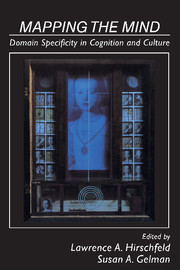Book contents
- Frontmatter
- Contents
- List of contributors
- Preface
- Part I Overview
- Part II The origins of domain knowledge: Biology and evolution
- Part III The origins of domain knowledge: Conceptual approaches
- Part IV Are domains theories?
- Part V Domains across cultures and languages
- Part VI Implications for education
- Author index
- Subject index
Preface
Published online by Cambridge University Press: 04 August 2010
- Frontmatter
- Contents
- List of contributors
- Preface
- Part I Overview
- Part II The origins of domain knowledge: Biology and evolution
- Part III The origins of domain knowledge: Conceptual approaches
- Part IV Are domains theories?
- Part V Domains across cultures and languages
- Part VI Implications for education
- Author index
- Subject index
Summary
This volume presents research and theoretical discussion on domain specificity in human thought. “Domain specificity” is the idea that all concepts are not equal, and that the structure of knowledge is different in important ways across distinct content areas. The notion of domain specificity has received much attention in recent years, but surprisingly it has not yet been given a unified treatment. A sense of how widely this concept has been discussed can be seen by viewing the range of disciplines represented in this volume: philosophy, psycholinguistics, linguistics, cultural anthropology, biological anthropology, developmental psychology, cognitive neuroscience, and education. We hope that the volume will thus be of interest to scholars in a broad range of disciplines.
The present volume is based on a conference, “Cultural Knowledge and Domain Specificity,” held in Ann Arbor, Michigan, October 13–16,1990. The conference was an attempt to discover if the notion of domain specificity could be discussed profitably (even intelligibly!) across disciplinary lines. Most important, we had the strong hope and belief that knowing more about other traditions could be valuable in informing our own local interests. In preparation for the conference, participants distributed their papers well in advance. Accordingly, we requested attendees to devote little time to formal presentations so that we could focus on discussions, both formal among the entire group and informal among participants over coffee breaks and on walks around campus. We were delighted to discover that we had in fact a lot to say to one another. We believe that this is evident in the chapters that follow.
- Type
- Chapter
- Information
- Mapping the MindDomain Specificity in Cognition and Culture, pp. xiii - xivPublisher: Cambridge University PressPrint publication year: 1994

